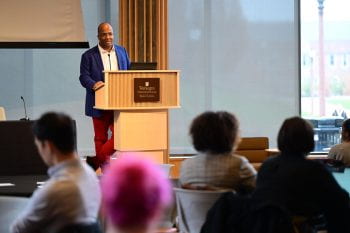Stephen Roll, associate director of research at SPI, received an equitable growth grant from the Washington Center for Equitable Growth
Faculty receive equitable growth grants (Links to an external site)


Stephen Roll, associate director of research at SPI, received an equitable growth grant from the Washington Center for Equitable Growth

Phil Marotta was quoted regarding his work on HIV in rural areas, and the impact stigma has on important health decisions.

Stephen Roll, associate director of research, did an interview with the New York Times on how to best use your tax refund
St. Louis school mobility was investigated by St. Louis School Research-Practice Collaborative at Washington University, showing a high percentage of student’s changing schools
Michal Grinstein-Weiss, director, is listed as an expert on the housing market, and the effects it can have on productivity.
Following President Biden’s call to restore the Child Tax Credit, ABC27 cited SPI research demonstrating the positive effects of the policy.

Jason Jabbari, associate director of community partnerships, spoke about findings from a report he co-authored on the correlation between school security and academic performance.

$25,000 was awarded to Operation Food Search in order to broaden the Fresh RX program

Bank of America has awarded a grant to Operation Food Search, to expand the Fresh RX program.

Benefits Data Trust highlighted some key points their CEO, Trooper Sanders, made when he gave the Keynote Address at the DSSI Summit.

An SPI research report on the effects of the 2021 Expanded Child Tax Credit was cited in a submission by Human Rights Watch to the United Nations.
Jason Jabbari, associate director of community partnerships, has been awarded a two-year grant to study social mobility and equity in programs.
AFCPE announced their award winners for 2022, and SPI research won Outstanding Research Journal Article of the Year.
Social Policy Institute research was cited in this opinion piece on social mobility and its impact on children in Israel.
The Record announced a recent William T. Grant award for an education-based research grant with a research-practitioner partnership conducted by Jason Jabbari, research assistant professor of SPI.
Vox shares research on the impact of surveillance on children’s educational outcomes by Jason Jabbari, research assistant professor of SPI, and Odis Johnson, faculty affiliate of SPI.
In an exclusive with The Marker, the Social Policy Institute investigated the economic impact of Ramadan in Israel.

West Virginia Public Broadcasting interviewed Leah Hamilton, associate professor at SPI, about the effects of the child tax credit on families, highlighting SPI’s finding that 52% of West Virginian parents reported spending the payment on food.
Marketplace references an SPI study on the expanded child tax credit which examined the ways in which CTC recipients used the payments.

Deseret News highlights a recent SPI study on the expanded child tax credit, examining the ways in which parents used the payments.
The Marketplace interviewed Elaine Maag, senior fellow of the Tax Policy Center and co-author of the Child Tax Credit report by SPI, on the impacts the credit had on the financial security of American families.

The Intelligencer highlighted the recent SPI study looking at how parents used the payments not only for basic needs, but also to invest in their children’s futures.

HuffPost highlights findings from an SPI study on the CTC that show the payments enabled many parents to stop resorting to risky ways to make ends meet.
Yahoo Money interviewed Stephen Roll, research assistant professor at SPI, about the spike in unemployment in parents following the termination of the CTC payments.
Basic Income Today featured results from an SPI study on the child tax credit, finding that the termination of the CTC was followed by households experiencing decreased employment.
The National Interest cites a recent SPI study by Stephen Roll, Yung Chun, and Leah Hamilton, that found no evidence that the increased payments led to parents leaving their jobs.

Stephen Roll, associate director of research at the Social Policy Institute, was interviewed by Yahoo! Money about a recent survey that found that employment did not decline during the period that the Child Tax Credit was in effect.

CNBC News interviewed Stephen Roll, SPI research assistant professor, about the effects of the child tax credit on families and the workforce.
The Center for the National Interest highlighted SPI’s study finding that the Child Tax Credit supported parents to start their own small businesses.
AS news summary featured an SPI study which found no evidence that the child tax credit payments negatively affected employment.
Loudoun Times-Mirror cites results from a recent SPI study which examined the impact of the CTC on employment.
The Center for the National Interest discussed SPI’s recent Child Tax Credit (CTC) study which found that the CTC did not create a significant change in the labor force.
Phys Org published an article from The Source which shared results from an SPI study finding that the child tax credit payments did not affect employment.

Futurity shared a recent analysis by researchers at SPI and Appalachian State University which found no evidence that the child tax credit payments encouraged unemployment.
The Source shares results from a recent SPI study which shows that employment among parents did not decrease following the child tax credit payments.

NPR highlights a recent SPI study which analyzed spending data to find the ways in which families utilized their child tax credit payments.
The Hill shares results from an SPI study which shows the benefits of the CTC for low-income families.
The Baltimore Sun highlights a recent SPI study which analyzed how unemployment was affected by the child tax credit payments.
Newsweek highlights a recent study from SPI and Humanity Forward which found that most parents planned to keep working after receiving the CTC.
The Cleveland Jewish News highlighted results from a recent SPI study which found an increased number of children suffering from anxiety after the pandemic.
The Algemeiner shared a recent SPI study showing a significant increase in anxiety in children following the pandemic.
Researchers at SPI have worked hard throughout the pandemic to study the socioeconomic effects of COVID-19, both in the U.S. and in Israel. Global highlights how this work has informed public policy.
Deseret News highlighted results from an SPI study analyzing the impact of the child tax credit payments.
Michal Grinstein-Weiss, director of SPI, and Oren Heller, postdoctorate researcher, were interviewed by Ynet about a study on access to new vocational training in Israel.